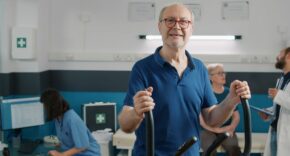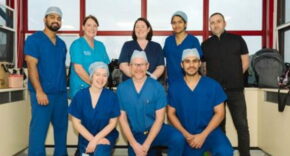
A highly successful trial of new internet connectivity technology in the East of England that has been endorsed by NHS England’s Digital Team has led directly to reductions in ambulance transfers of care at a number of hospital emergency departments, created immediate enhancements in thousands of patients’ experiences of their care and improved the working lives of frontline ambulance and hospital staff as they continue to battle the challenges of the pressured NHS urgent and emergency care system.
The solution has improved the speed and reliability of transferring vital patient data at accident and emergency departments where poor mobile signal and unreliable Wi-Fi connections can often cause significant delays and loss of access to key patient information when crews are waiting to handover patients.
It is now being offered to other NHS providers keen to achieve similar outcomes for their patients in staff in other parts of the country.
East of England Ambulance Service NHS trust (EEAST) paramedics use handheld devices with 4G connectivity to update electronic patient records (EPR) and share vital information with hospitals via the Summary Care Record (SCR) system. The SCR provides hospital clinicians with a single, up-to-date source of patient information for effective care. However, poor mobile signal, especially in ambulance bays, often delays this digital handover, disrupting patient care and increasing the risk of errors such as medication duplication or omission.
Connectivity challenges also arise from hospital layouts, including metal structures, lead-lined rooms, and outdated designs that hinder signal quality. These issues frustrate clinicians and impede efficient workflows, as delays in transferring patient data reduce their ability to make timely, informed decisions.
To resolve the issue emergency services specialist connectivity provider Excelerate Technology deployed its Hybrid Connectivity solution outside A&E departments at Harlow, Peterborough, Luton and Colchester hospitals. This clever solution allows for permanent connectivity through switching seamlessly between multiple cellular and satellite-based signals (if required) to achieve the strongest, most robust connection at all times, using a specialist router, wireless access points and the latest antennas to optimise terrestrial cellular networks, placed in and around ambulance bays to receive multiple mobile signals and combine them into a single Wi-Fi output to transform internet access in the most affected areas.
Once connected to the system through their iPads, ambulance crews were able to re-connect automatically every time they were in the vicinity.
Key outcomes of the trial
- Over 37,700 devices connected successfully over a five-month period.
- More than one terabyte of data was transferred.
- 9000+ patient records updated in the first four weeks.
- Achieved 99% availability with speeds of up to 127 Mbps.
What the NHS is saying
Kim Sage, Hospital Ambulance Liaison Officer (HALO), Colchester Hospital said: “Since installation I have not had a crew come up to say they have lost connection or had any concerns.”
Phil Elvidge, ePCR Clinical Lead at EEAST said: “It’s great to see this technology enhancing the connection at our trial acute sites and at Peterborough we have already had discussions with our neighbouring ambulance service about providing this connectivity to them as well.”
Neil Godfrey, Interim Chief Digital Information Officer for East of England Ambulance Service NHS trust, said: “When our crews lose their connection outside hospitals, their clinical apps stop being able to pull information from our Computer Aided Dispatch system which prevents them uploading information to our key partners. Thanks to the new trial at these four hospitals, we have been able to consistently access the Summary Care Records and National Record Locator. This means our crews can view patients’ end of life and mental health plans, giving them access to crucial information.
“We remain committed to refining and developing the system to deliver robust connectivity to help crews make the right clinical decisions for our patients, reduce hospital handover times and allow them to get back on the road to tend to other patients.”
The NHS England website stated: “The solution provided has met the stated objectives of the trial, vastly improving connectivity to crews during a vital part of a patient’s journey. EEAST’s trial has highlighted both the unique challenges that trusts face when first attempting large scale deployments, as well as highlighting the opportunity and benefits that can come from better connectivity. This trial highlights how successful technical innovation for the NHS encompasses the provision of basic functionality and connectivity where required by the clinical workflows.”
Rolling out to other parts of the NHS
Bethan Evans, Chief Operating Officer at Excelerate Technology says: “We were delighted to work closely with NHS England, the local ambulance service and local hospital teams to be able to deploy our latest technology in the East of England to directly benefit patient care and our message is this. If you are an NHS ambulance trust, an NHS hospital with a busy emergency department or a local integrated care board and you are keen to reduce hospital handover delays in your patch while simultaneously enhancing patient experience of their care and improving the daily working lives of your staff, our proven enhanced connectivity solution is for you. The technology is small and discreet, the solution is not expensive and can be set up in a matter of days, with extremely minimal disruption to your hospital or ambulance service.”
NHS review of the trial shows distinct benefits
A recent NHS England review of the trial found that benefits of better connectivity and improved data speeds included:
- Improved patient care: Enhanced connectivity ensured accurate, real-time updates to care records, reducing clinical risks and improving outcomes.
- Faster handovers: Reliable connections shortened delays, enabling ambulances to return to service quickly.
- Increased staff satisfaction: Reduced frustrations with connectivity allowed clinicians to focus on care, boosting morale.
- Operational efficiency: Faster patient handovers alleviate pressure on hospitals and reduce NHS costs. The report by NHS England said the trial’s success has prompted plans for additional deployments across sites in the EEAST region where Wi-Fi connectivity is an issue.
NHSE trial report in full
The full NHS England EEAST trial report can be viewed here: Improving ambulance and A&E department connectivity – NHS England Digital
For more information and an informal chat about how Excelerate Technology could provide your local health and care system with enhanced connectivity please contact: BethanE@Excelerate.info











